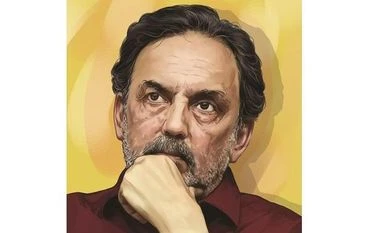Prannoy Roy, co-chairperson of New Delhi Television (NDTV), is known for his cool and measured style of anchoring, something that has held him and his network in good stead over nearly four decades, since the company was founded in 1984.
On Tuesday, a different side of NDTV and Roy emerged, as the Adani group announced it had exercised rights to acquire an indirect stake of 29.18 per cent in the company, which would trigger an open offer for an additional 26 per cent shareholding in the firm.
Roy, 72, was quick to respond. And he did so on the front foot. NDTV released a statement on Tuesday evening saying the founder-promoters had not consented to the exercise of rights, nor was any conversation or input given on the matter. The gloves were clearly off in this hostile takeover of NDTV.
Tempest, his childhood nickname, was finally raging. Roy and his wife Radhika, both founder-promoters of NDTV, have signalled that they are weighing all options in this ownership battle, which is expected to drag on as the two sides make their moves.
The Roys, both from Kolkata, met in Dehradun in the 1960s while studying at elite schools. She was from Welham Girls’, he was from Doon School. They moved to London to study further, married, and then settled in Delhi.
While Radhika worked for various media organisations in Delhi, Roy obtained a doctorate in economics, taught at the Delhi School of Economics, and initially famously focused on election analysis.
The news magazine programme, The World This Week, was the first big step that Roy and his wife took in television journalism in 1988 and it proved a turning point for Indian news television at the time. While he was in front of the camera, she chose to be behind it, producing the show, ensuring editorial standards were met. Roy’s laid-back conversational style and a neatly-packaged round-up of the week’s international events delivered to an audience used to staid Doordarshan bulletins ensured the show was an instant hit. The World This Week ran till 1995 on Doordarshan, cementing Roy’s position as a premier television anchor.
NDTV successfully rode the TV boom that followed with the opening up of the cable and satellite market in the 1990s. It got more contracts from Doordarshan including The News Hour and Good Morning India in the mid-1990s.
By 1996, NDTV found a foreign investor, signing up with Rupert Murdoch’s Star network to produce programmes for the channel Star Plus. Two years later, NDTV and Star signed a five-year deal to launch and run the 24-hour news channel Star News. It was inaugurated in February 1998, ahead of the general elections in 1999.
By 2004, NDTV had launched its own 24-hour news channels, one in English and the other in Hindi. It listed on the bourses the same year. This was the second phase of growth for NDTV marked by editorial excellence and a need to keep a sane voice at a time when news media was slowly becoming loud and competitive. NDTV stood out for its anchors, who became the face of prime-time news journalism in India, including names such as Barkha Dutt, Rajdeep Sardesai and Arnab Goswami, the last two going on to launch their own rival news channels.
Through the peaks and troughs of news journalism over the last two decades, Roy has maintained his composure, focusing on getting stories right, rather than breaking stories first. Anchors on NDTV, both English and Hindi, try to avoid engaging in loud debates, emphasise putting the facts forward without sensationalising stories, and look at the human impact closely.
But the rapid expansion of the group — lifestyle channels, online shopping sites and so on — also took its toll on a company operating in a business where operating costs are typically high in any case, though it made a profit in FY22. This is what led the promoters to borrow from Vishva Pradhan Commercial (VPCL). These loans, which have come to haunt Roy, are linked in part to his need to shore up his and his wife’s shareholding in the company, media sector experts said. However, the opaque nature of the transactions and their non-disclosure spelt trouble for Roy, increasing his run-ins with regulators.
No surprise, then, that the last few years have seen Roy grapple with questions regarding NDTV’s ownership following non-disclosure of promoter loans taken by him and his wife. In 2019, the Securities and Exchange Board of India (Sebi) concluded that the lender, VPCL, a company now acquired by the Adani group, was controlling NDTV, which the company disputed.
Last month, the Securities and Appellate Tribunal slashed the fine levied on NDTV and its promoters for non-disclosure of promoter loans and dismissed Sebi’s conclusion of indirect control by VPCL. Developments on Tuesday indicate otherwise. The clock is clearly ticking for Roy.
Unlock 30+ premium stories daily hand-picked by our editors, across devices on browser and app.
Pick your 5 favourite companies, get a daily email with all news updates on them.
Full access to our intuitive epaper - clip, save, share articles from any device; newspaper archives from 2006.
Preferential invites to Business Standard events.
Curated newsletters on markets, personal finance, policy & politics, start-ups, technology, and more.
)